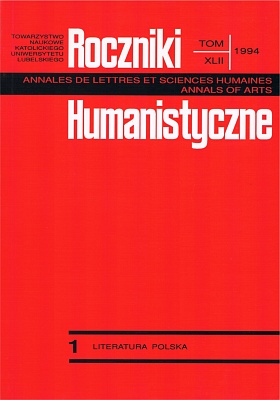The Christian Contexts of August Strindberg's Dramaturgy
Abstract
August Strindberg's dramaturgy has up to now come out as a surprise for researches due to its precursory writing technique. Nevertheless there are considerable revaluations in the estimation of his ideal and artistic consciousness. Until recently the artist has functioned in the Polish reception as a misogynist, enemy of women, rather naturalist than author of plays which have brought about a breakthruogh in contemporary world drama. Nor has he been perceived as an author significant for the searching of a new form of theatre, theatre of freedom, breaking barriers of any convention. On the other hand, he is closely and permanently bound with the existential condition of man.
The present text seeks to prove that one can find in the dramatic works of this prominent writer some profound layers of Christian awareness among the heroes, some strong ties with the Bible, indisputable aspects of religiousness drawn from being a Christian as well as any concequences which follow from it. This can especially be noticed in the dramas of the so-called post-inferno period. Given the variety of techniques in referring to the Scriptures which is a norm of his faith, he most eagerly evokes appropriate contexts for the act of faith by using an accurate verbal construction. He refers to the memory of a spectator who lives by the Bible every day in the liturgy of the Word. The Bible helps him at the same time to define the awareness of faith in his heroes, the moral and ethical aspect as well as to accomplish the aesthetic ends of poetic illustration. Sometimes he directly quotes certain sentences, employs analogy more often, making use of a biblical metaphor. He borrows inspiration from the biblical personifications, especially in historical drama's, in order to give the actions of his characters a supernatural dimension, to define the uniqueness of a situation or its transcendent direction. Religious terminology is no alien to Strindberg, resulting from the experience of being a Christian. His faith is based on religious determinism, proper to the Evangelical and Lutheran branch of Protestantism. Yet one can find occassionally syncretism in his standpoint.
Copyright (c) 1994 Roczniki Humanistyczne

This work is licensed under a Creative Commons Attribution-NonCommercial-NoDerivatives 4.0 International License.





